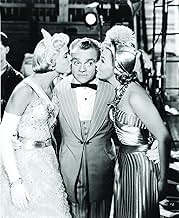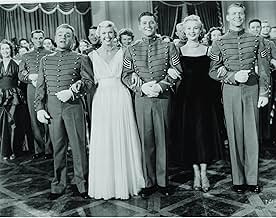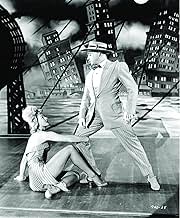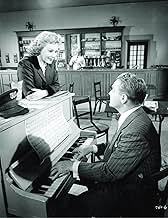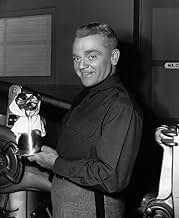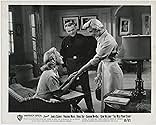PUNTUACIÓN EN IMDb
6,2/10
1,6 mil
TU PUNTUACIÓN
Añade un argumento en tu idiomaA Broadway director helps the West Point cadets put on a show, aided by two lovely ladies and assorted complications.A Broadway director helps the West Point cadets put on a show, aided by two lovely ladies and assorted complications.A Broadway director helps the West Point cadets put on a show, aided by two lovely ladies and assorted complications.
- Dirección
- Guión
- Reparto principal
- Nominado para 1 premio Óscar
- 2 nominaciones en total
John Baer
- Young Cadet
- (sin acreditar)
DeWit Bishop
- Cadet
- (sin acreditar)
Jack Boyle Jr.
- Cadet in Show
- (sin acreditar)
Tex Brodus
- Cadet
- (sin acreditar)
Wheaton Chambers
- President's Secretary
- (sin acreditar)
Chuck Courtney
- Plebe
- (sin acreditar)
Paul Cristo
- Officer
- (sin acreditar)
Luther Crockett
- Senator
- (sin acreditar)
Reseñas destacadas
... but just forget that and have fun with it. Cagney is Elwin "Bix" Bixby who is a washed up Broadway director, not because he is bad at his job, but because he crossed producer Eberhart (Roland Winters) by getting dancer/singer Jan Wilson (Doris Day) out of the chorus where he felt she was misused, and into a Hollywood contract by teaching her everything he knew.
Bix has a chance to square things with Eberhart and his increasingly impatient fiancée (Virginia Mayo as Eve) by taking a job at West Point directing a show written by Eberhart's nephew, cadet Tom Fletcher (Gordon McRae). What Eberhart really wants is his nephew to leave the army and go on Broadway, where he feels his talents won't be wasted. Bix takes the job, and is soon agreeing with Eberhart's assessment - Tom has the looks, can sing, dance AND wrote the show. Bix can't figure why Tom wants to work for minor duckets in the Army when he could clean up and be famous on Broadway. Why doesn't he just quit West Point? Now Bix is not a bad guy. He's got great courage, he just has a problem with rules, doesn't quite get the concept of camaraderie, and he has an unruly temperament - would you expect less from a Cagney role? Bix just doesn't get these cadets only showing up for rehearsal when their classes and the academy rules permit it, and then one day he punches a cadet and is out of a job UNLESS he becomes a cadet, living the life a cadet along with the uniform, the haircut, and the plebe status. At this point Bix's war record is brought up. Like I said before he had great courage, even saving his platoon in Italy in WWII, but he went AWOL so many times that if this film was true to life he'd actually be in Leavenworth turning big rocks into little ones. This is one of many times you are just going to have to suspend your beliefs.
How does Doris Day figure into all of this? Well it turns out Day, as the girl Bix rescued from the chorus line years ago, is in town, so Bix gets permission to try and get her to come to West Point for an appearance AND he tries to talk her into being the princess in the play. If not they are stuck with Alan Hale Jr. as the princess and romantic lead to Gordon McRae's character. There is only so much suspension of belief that an audience can take! All of this is just a chance for Bix to learn the importance of rules and teamwork he never learned in the war, for some patriotic numbers and speeches that didn't do a movie studio any harm in 1950 in the age of HUAC, and for Warner Brothers to "pass the baton" as you might say to their new generation of singers and dancers, embodied by McRae and Doris Day. Don't worry though, there is enough of Cagney's great dancing to satisfy.
The weirdest thing for me - seeing Cagney and Mayo play a rather functional couple after seeing them together in 1949's White Heat where they had the kind of love life you would expect between a psychopath and a gun moll with wandering eyes.
Bix has a chance to square things with Eberhart and his increasingly impatient fiancée (Virginia Mayo as Eve) by taking a job at West Point directing a show written by Eberhart's nephew, cadet Tom Fletcher (Gordon McRae). What Eberhart really wants is his nephew to leave the army and go on Broadway, where he feels his talents won't be wasted. Bix takes the job, and is soon agreeing with Eberhart's assessment - Tom has the looks, can sing, dance AND wrote the show. Bix can't figure why Tom wants to work for minor duckets in the Army when he could clean up and be famous on Broadway. Why doesn't he just quit West Point? Now Bix is not a bad guy. He's got great courage, he just has a problem with rules, doesn't quite get the concept of camaraderie, and he has an unruly temperament - would you expect less from a Cagney role? Bix just doesn't get these cadets only showing up for rehearsal when their classes and the academy rules permit it, and then one day he punches a cadet and is out of a job UNLESS he becomes a cadet, living the life a cadet along with the uniform, the haircut, and the plebe status. At this point Bix's war record is brought up. Like I said before he had great courage, even saving his platoon in Italy in WWII, but he went AWOL so many times that if this film was true to life he'd actually be in Leavenworth turning big rocks into little ones. This is one of many times you are just going to have to suspend your beliefs.
How does Doris Day figure into all of this? Well it turns out Day, as the girl Bix rescued from the chorus line years ago, is in town, so Bix gets permission to try and get her to come to West Point for an appearance AND he tries to talk her into being the princess in the play. If not they are stuck with Alan Hale Jr. as the princess and romantic lead to Gordon McRae's character. There is only so much suspension of belief that an audience can take! All of this is just a chance for Bix to learn the importance of rules and teamwork he never learned in the war, for some patriotic numbers and speeches that didn't do a movie studio any harm in 1950 in the age of HUAC, and for Warner Brothers to "pass the baton" as you might say to their new generation of singers and dancers, embodied by McRae and Doris Day. Don't worry though, there is enough of Cagney's great dancing to satisfy.
The weirdest thing for me - seeing Cagney and Mayo play a rather functional couple after seeing them together in 1949's White Heat where they had the kind of love life you would expect between a psychopath and a gun moll with wandering eyes.
He spits out lame dialog like it was Shakespeare, he talk-sings with a verve that could give Rex Harrison or Robert Preston lessons, he stomps up and down, he uppercuts, he dances up a storm. There's plenty of A-list talent in this uninspired Warners musical, but a 51-year-old Cagney is pretty much the whole show, and he appears to believe in the hole-filled plot so much that you buy it, too, despite the many lapses of logic. I find his teaming with Virginia Mayo a little distasteful--he's plainly too old for her--but she lends a lot of enthusiasm, too, as does Doris Day, given some middling Jule Styne-Sammy Cahn ballads to warble (and some very unattractive gowns to model), and Gene Nelson, tapping exuberantly, and Gordon MacRae, with his fine natural baritone. Cagney felt he did his best dancing in this film, and it's worth sitting through the dated, hit-you-on-the-head patriotism and weird plot mechanics to get to his virtuosic numbers--he even taps a bit with Day, who started out as a dancer and keeps up brilliantly with him. It's not a good movie, exactly, but I'd trade a lot of neater, better-crafted musicals for this one's dumb liveliness, and for Cagney's genius. I mentioned Robert Preston above; Cagney was, in fact, considered for Professor Harold Hill before Preston was hired. I think he'd have been terrific.
James Cagney really gives his all (and that's plenty of talent) to the role of a rambunctious song-and-dance man who takes over a show at West Point, with the help of a talented cast including Virginia Mayo, Doris Day, Gordon MacRae and Gene Nelson. Cagney struts around getting angry and defiant as only he can, bringing lots of much needed life to a tiresome script. It's one of his best as a song-and-dance man, making one wish he had done even more musical films.
But this one could have used Technicolor and a wittier script with better songs. All of the talent cannot overcome the story's limitations and the overuse of rear projection photography for many of the outdoor scenes. Alan Hale, Jr. gets some good chuckles out of his "Princess" role and there's a light-heartiness about the whole film that keeps it entertaining enough for the most part.
Doris Day is missing from the first third of the movie, but once she shows up she demonstrates why she became such a cheerful Warner Bros. star. She and Gordon MacRae do nicely by a couple of forgettable songs.
Summing up: Worth seeing for Cagney alone. He's in fine shape for some energetic dance routines.
But this one could have used Technicolor and a wittier script with better songs. All of the talent cannot overcome the story's limitations and the overuse of rear projection photography for many of the outdoor scenes. Alan Hale, Jr. gets some good chuckles out of his "Princess" role and there's a light-heartiness about the whole film that keeps it entertaining enough for the most part.
Doris Day is missing from the first third of the movie, but once she shows up she demonstrates why she became such a cheerful Warner Bros. star. She and Gordon MacRae do nicely by a couple of forgettable songs.
Summing up: Worth seeing for Cagney alone. He's in fine shape for some energetic dance routines.
A silly story, forgettable songs and a poor stage show of cadets on parade. But what fun! The best thing Doris Day did while at Warner Bros. The most alive performance of Virginia Mayo ever. And James Cagney at his best, dancing, fighting, arguing and filling the picture with his legendary personality. It must be seen to be believed. Cagney, the street boy, the gangster, the tough guy, shines and sparkles in musicals. His performance here is as good if not better than the one that earned him an Oscar (Yankee Doodle Dandy). And this, immediately after his brilliant, hideous, terrific work in White Heat. What an actor! What a dancer! What a performer! It is impossible to define the fine qualities of Roy Del Ruth direction: the man who made some of the better (Folies Bergere de Paris, Broadway Melody of 1936, On the Avenue) as well as some of the worse (Du Barry was a Lady, Broadway Rhytm) musicals in Hollywood history, excelled in West Point Story,working with a screenplay that was only bright dialogue with no story to speak of. See it and understand how Hollywood in its golden age, knew how to make gold out of plumb.
Next to "Yankee Doodle Dandy", this has Cagney's best dancing. It also has some fine dancing and singing from Virginia Mayo, Doris Day, Gordon MacRae & Gene Nelson. They all do very well, along with an early funny performance by Alan Hale Jr.
Shot in Technicolor, with better songs and more plausible story, this could have been another "The Bandwagon".
Cagney's role is similar to his role in the earlier musical 'Footloght Parade'. As in "Footlight", at one point, one of the dancers is unable to go on and Cagney's character fills in for him. Virginia Mayo plays the same sort of wise-cracking sexy blonde that Joan Blondell played in "Footlight".
The main main plot is Cagney being pressured into joining West Point to help them put on a musical. Adding to that implausibility is a cadet (Gordon MacRae) with a magnificent voice preferring to make a career in the Army, even after falling in love with a famous singing star (Doris Day basically playing herself).
The romance between Cagney and Mayo isn't so far fetched when you look at the movies Fred Astaire made with Leslie Caron, Audrey Hepburn and others. Virginia Mayo displays a fine dancing talent and lovely singing voice, and Doris Day shows she could dance as well as sing. I wish they'd left out the long patriotic number with Gordon MacRae and let him sing a ballad or duet with Doris. Gene Nelson is totally wasted here; they really didn't let him have a big dance number like his Kansas City number in "Oklahoma!" The movie would have been improved had there been an estrangement between Mayo and Cagney with perhaps a dalliance between Mayo and Nelson sparking jealousy in Cagney.
Even though Cagney is noticeably heavier here than in "Yankee Doodle Dandy", he still dances very well and delivers a comic performance complete with facial mugging and explosive tantrums. Those tantrums with lots of hopping up and down like a Warner Bros. cartoon character couldn't have been good for Cagney's 50 year old knees! Alan Hale Jr. was quite funny especially when his huge bulk is next to the short statured Cagney. Warner's should have made some sort of police comedy buddy movie with Hale and Cagney.
I enjoyed seeing Cagney and Mayo once again playing totally different parts. They play off each other very well as do Cagney and Day. It's obvious that MacRae and Day look so cute together that they just had to make more movies together with better songs. Cagney was sufficiently impressed with Doris Day that he pushed for her to get the Ruth Etting part in "Love Me Or Leave Me".
Shot in Technicolor, with better songs and more plausible story, this could have been another "The Bandwagon".
Cagney's role is similar to his role in the earlier musical 'Footloght Parade'. As in "Footlight", at one point, one of the dancers is unable to go on and Cagney's character fills in for him. Virginia Mayo plays the same sort of wise-cracking sexy blonde that Joan Blondell played in "Footlight".
The main main plot is Cagney being pressured into joining West Point to help them put on a musical. Adding to that implausibility is a cadet (Gordon MacRae) with a magnificent voice preferring to make a career in the Army, even after falling in love with a famous singing star (Doris Day basically playing herself).
The romance between Cagney and Mayo isn't so far fetched when you look at the movies Fred Astaire made with Leslie Caron, Audrey Hepburn and others. Virginia Mayo displays a fine dancing talent and lovely singing voice, and Doris Day shows she could dance as well as sing. I wish they'd left out the long patriotic number with Gordon MacRae and let him sing a ballad or duet with Doris. Gene Nelson is totally wasted here; they really didn't let him have a big dance number like his Kansas City number in "Oklahoma!" The movie would have been improved had there been an estrangement between Mayo and Cagney with perhaps a dalliance between Mayo and Nelson sparking jealousy in Cagney.
Even though Cagney is noticeably heavier here than in "Yankee Doodle Dandy", he still dances very well and delivers a comic performance complete with facial mugging and explosive tantrums. Those tantrums with lots of hopping up and down like a Warner Bros. cartoon character couldn't have been good for Cagney's 50 year old knees! Alan Hale Jr. was quite funny especially when his huge bulk is next to the short statured Cagney. Warner's should have made some sort of police comedy buddy movie with Hale and Cagney.
I enjoyed seeing Cagney and Mayo once again playing totally different parts. They play off each other very well as do Cagney and Day. It's obvious that MacRae and Day look so cute together that they just had to make more movies together with better songs. Cagney was sufficiently impressed with Doris Day that he pushed for her to get the Ruth Etting part in "Love Me Or Leave Me".
¿Sabías que...?
- CuriosidadesThe year she made this, Doris Day also made her first appearance in the Quigley Top 25 Box Office Stars poll, placing at #24. She would remain on the list every year until she retired from making movies in 1968, and was ranked #1 four times in the early 1960s.
- PifiasAt last minute, Jan (a female movie star) makes a surprise appearance in a role in an all-male West Point revue, in a part everyone assumed was to be played by a man. But a few minutes later there's a photo of her in closeup in the program featuring stars of the production.
- Citas
Eve Dillon: You heel! Can't even pay a hotel bill! In debt up to your ears, and it's horses! Horses every second you're awake! Horses, horses, horses!
Elwin 'Bix' Bixby: [unapologetically] I don't drink or smoke.
- ConexionesFeatured in Grandes biografías: Doris Day: It's Magic (1998)
- Banda sonoraAlma Mater
(uncredited)
Music by Friedrich Kücken (song Treue Liebe)
Lyrics by Paul S. Reinecke
Sung by a chorus during the opening credits
Selecciones populares
Inicia sesión para calificar y añadir a tu lista para recibir recomendaciones personalizadas
- How long is The West Point Story?Con tecnología de Alexa
Detalles
- Duración
- 1h 47min(107 min)
- Color
- Relación de aspecto
- 1.33 : 1
Contribuir a esta página
Sugerir un cambio o añadir el contenido que falta


